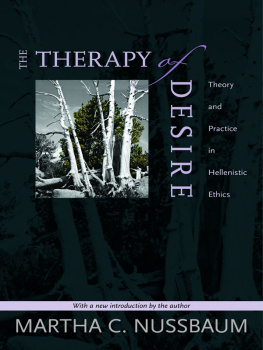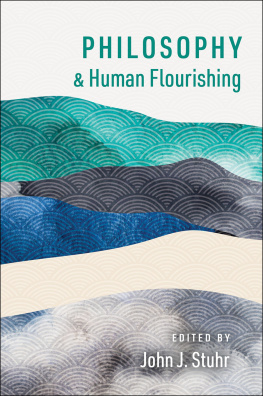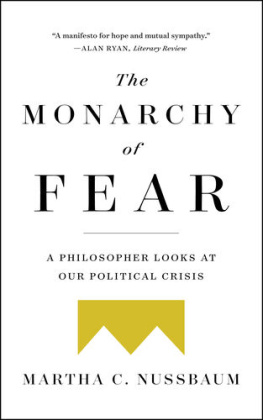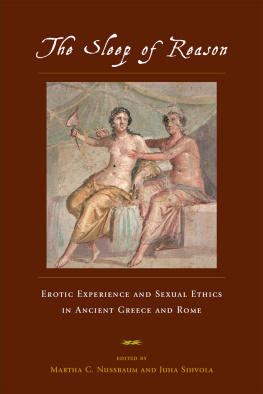
The Therapy of Desire

MARTIN CLASSICAL LECTURES
The Martin Classical Lectures are delivered annually at Oberlin College through a foundation established by his many friends in honor of Charles Beebe Martin, for forty-five years a teacher of classical literature and classical art at Oberlin.
John Peradotto, Man in the Middle Voice: Name and Narration in the Odyssey
Martha C. Nussbaum, The Therapy of Desire: Theory and Practice in Hellenistic Ethics
Josiah Ober, Political Dissent in Democratic Athens: Intellectual Crisis of Popular Rule
Helene R Foley, Female Acts in Greek Tragedy
Mark W. Edwards, Sound, Sense, and Rhythm: Listening to Greek and Latin Poetry
Anne Carson, Economy of the Unlost (Reading Simonides of Keos with Paul Celan)
Michael C. J. Putnam, Poetic Interplay: Catullus and Horace
Julia Haig Gaisser, The Fortunes of Apuleius and the Golden Ass: A Study in Transmission and Reception
The Therapy of Desire
THEORY AND PRACTICE IN HELLENISTIC ETHICS

With a new introduction by the author
Martha C. Nussbaum
PRINCETON UNIVERSITY PRESS
PRINCETON AND OXFORD
Copyright 1994 by Trustees of Oberlin College
Requests for permission to reproduce material from this work should be sent to Permissions, Princeton University Press
Published by Princeton University Press, 41 William Street, Princeton, New Jersey 08540
In the United Kingdom: Princeton University Press, 6 Oxford Street, Woodstock, Oxfordshire OX20 1TW
All Rights Reserved
First printing, 1994
First paperback printing, 1996
Paperback reissue, 2009
ISBN: 978-0-691-14131-2
The Library of Congress has cataloged the cloth edition of this book as follows
Nussbaum, Martha Craven, 1947
The therapy of desire : theory and practice in Hellenistic ethics / Martha C. Nussbaum. p. cm.
Includes bibliographic references and index.
ISBN 0-691-03342-0
1. Philosophy, Ancient. 2. Emotions (Philosophy)History. 3. Ethics, Ancient. I. Title.
B505.N87 1994
170.938dc20 93-6417
British Library Cataloging-in-Publication Data is available
The authors proceeds from the sale of this book will be donated to Amnesty International
The book has been composed in Sabon Typeface
Printed on acid-free paper.
press.princeton.edu
Printed in the United States of America
1 3 5 7 9 10 8 6 4 2
TO THE MEMORY OF GREGORY VLASTOS

Philosophy does not stand outside the world any more than mans brain is outside him because it is not in his stomach; but philosophy, to be sure, is in the world with its brain before it stands on the earth with its feet, while many other human spheres have long been rooted in the earth and pluck the fruits of the world long before they realize that the head also belongs to this world or that this world is the world of the head.
(KARL MARX, 1842)
The philosopher desires
And not to have is the beginning of desire.
To have what is not is its ancient cycle
It knows that what it has is what is not
And throws it away like a thing of another time,
As morning throws off stale moonlight and shabby sleep.
(WALLACE STEVENS, Notes Toward a Supreme Fiction)
 Contents
Contents
CHAPTER 1
Therapeutic Arguments |
CHAPTER 2
Medical Dialectic: Aristotle on Theory and Practice |
CHAPTER 3
Aristotle on Emotions and Ethical Health |
CHAPTER 4
Epicurean Surgery: Argument and Empty Desire |
CHAPTER 5
Beyond Obsession and Disgust: Lucretius on the Therapy of Love |
CHAPTER 6
Mortal Immortals: Lucretius on Death and the Voice of Nature |
CHAPTER 7
By Words, Not Arms: Lucretius on Anger and Aggression |
CHAPTER 8
Skeptic Purgatives: Disturbance and the Life without Belief |
CHAPTER 9
Stoic Tonics: Philosophy and the Self-Government of the Soul |
CHAPTER 10
The Stoics on the Extirpation of the Passions |
CHAPTER 11
Seneca on Anger in Public Life |
CHAPTER 12
Serpents in the Soul: A Reading of Senecas Medea |
CHAPTER 13
The Therapy of Desire |
 Introduction to the 2009 Edition
Introduction to the 2009 Edition
T HE THERAPY OF DESIRE (henceforth Therapy) appeared fifteen years ago, so it is time to reflect (as I did with the Updated Edition of The Fragility of Goodness on its fifteenth birthday) on some ways in which these intervening years have shed new light on the books primary themes and contentions. If I focus on my own ideas and not the huge amount of valuable work by others, it is simply because to do anything else would require a book at least as large again.
I. THE CENTRALITY OF HELLENISTIC ETHICS
Therapy attempted to show in just one area the fertility and quality of the Hellenistic schools and their debates. At the time that I began work on the book, around 1983, the profession had been slow to recognize this fact, and Plato and Aristotle still counted, for virtually all nonspecialist philosophers and most specialized scholars, as the central figures in what was called ancient philosophy (misleadingly, since the Indians and the Chinese also had distinguished ancient schools of philosophy, and it was only the Greeks and Romansand really mainly the Greeksthat people meant by this label). A group of distinguished scholars had begun meeting regularly in the triennial Symposia Hellenistic to try to change this situation, but even by 1994, when Therapy was published, their work had had relatively little influence on the profession as a whole.
The study of Hellenistic ethical thought has by now, however, become a firmly established part of the philosophical mainstream in both Anglo-American and continental European curriculaas both its quality and its historical importance have long warranted. So many scholars have done wonderful work on this area that an introduction could quickly become a bibliographical essay, and their work of both philosophical reconstruction and edition/translation has kindled a renewed appreciation for the subject. If I mention only the names of Julia Annas, Jonathan Barnes, Myles Burnyeat, Margaret Graver, Pierre Hadot, Brad Inwood, A. A. Long, Malcolm Schofield, David Sedley, Richard Sorabji, and Gisela Striker, I will be omitting many who have made outstanding contributions, but these names are particularly salient for the issues concerning emotion and philosophical therapy that are the primary concerns of Therapy.
Because of this outpouring of first-rate work, philosophers and teachers of humanities courses are beginning to recognize that rich and fascinating discussions of ethics, moral psychology, and political philosophy can be found in the writings of the Hellenistic thinkers, both Greek and Roman. They are also beginning to recognize that it is virtually impossible to teach the history of Western philosophy responsibly without dwelling on those contributions. To try to understand the work of Descartes, Leibniz, Spinoza, Hume, Adam Smith, Kant, Nietzsche, and other leading figures of modern European philosophy (not to mention earlier Christian thinkers) without appreciating their debt to the Hellenistic thinkers is a recipe for bad historical work. Nor can one appreciate accurately the philosophical milieu of the American Revolution without understanding the immense importance of Roman thought for thinkers such as Thomas Paine and James Madison. Gradually, these facts are beginning to be seen, and scholars are documenting these contributions.
Next page










